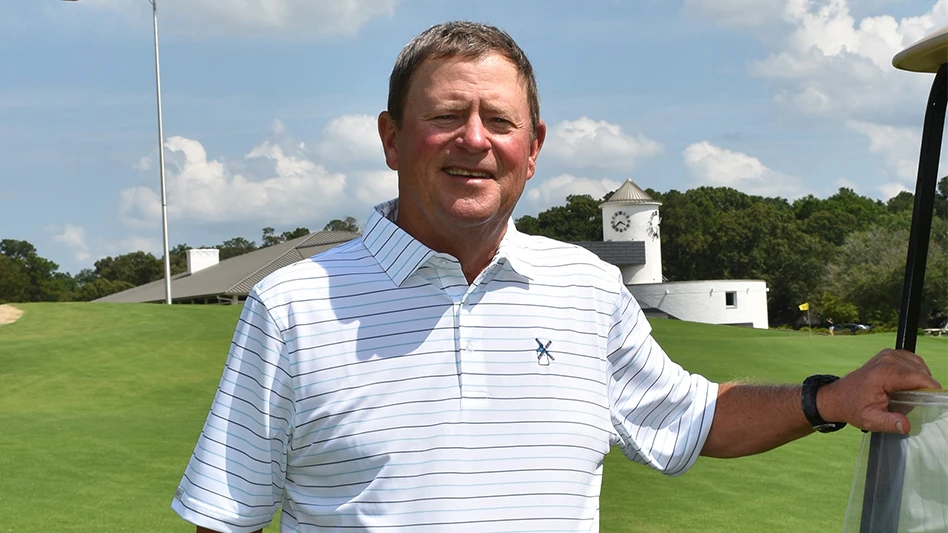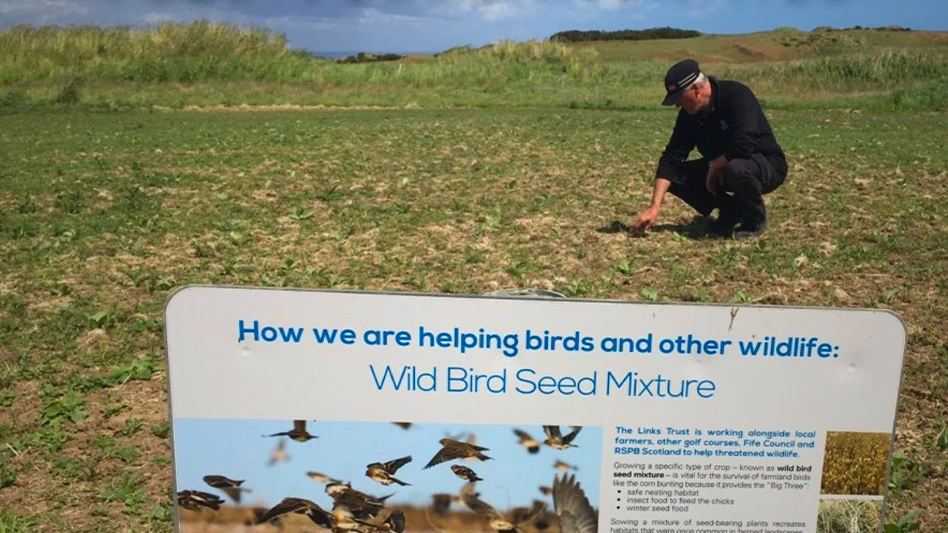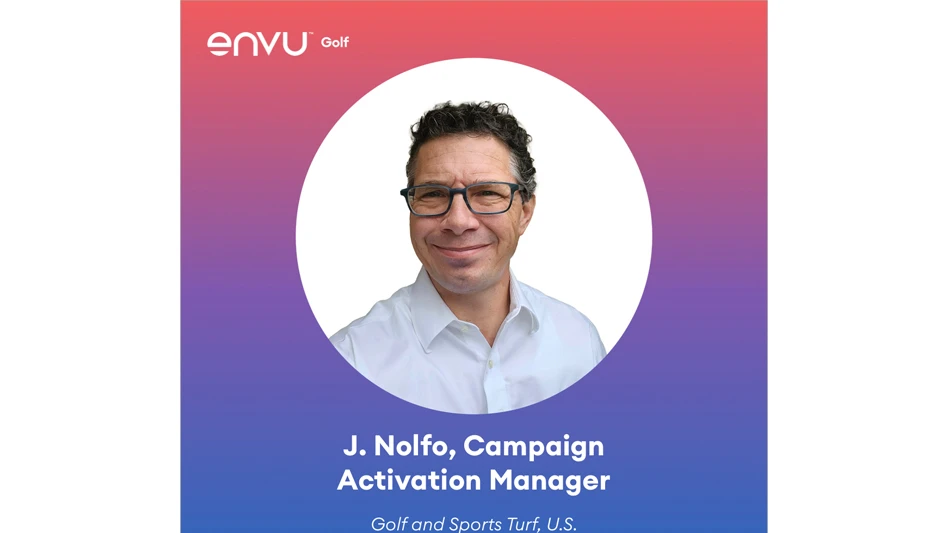It’s very common for people to develop close relationships with others to grow personally and professionally. But what might be less common are golf course superintendents who have close, working relationships with the owners of the courses they maintain. These types of relationships are cherished by superintendents and most likely won’t be developed again during their careers.
One of a kind
More than a year and a half ago, Curtis James left his job as golf course superintendent of the East Course at Merion Golf Club in Ardmore, Pa., to work for Jim Scott, owner and developer of Olde Stone Golf Club in Bowling Green, Ky.
“It’s been a dream of Mr. Scott’s to build a golf course and community because he wanted to give back to the city of Bowling Green,” James says.
James first met the 67-year-old Scott through the Arthur Hills design team, who designed the Olde Stone course. James describes Scott, who owns a construction and distribution business, as a loyal Southern gentleman who works every day and drives beat-up, old pickup truck.
“The first time I met Mr. Scott, we hit it off,” James says. “He saw in me what he was like – young, aggressive and likes to work. I taught him how to build a golf course, and he taught me about building roads and moving dirt. He’ll put forth the resources if you work and prove you’re worthy. He’s given me full range and doesn’t micromanage me. I’m not reporting to a board – I report to him only. Sometimes people think working for one owner is a nightmare, but as long as you do what you were hired to do, you’ll have a great working relationship.”
Golf course superintendents always will have unexpected circumstances arise when growing-in a new course, James explains, and Scott understands that because he bids jobs and has maintained budgets his entire career.
An example of the unexpected occurred when James started on the job and realized the irrigation system was set up for warm-season grass. Two heads at every station – one to water the rough and one to water the fairway – were needed to water the bluegrass and bentgrass, and it was going to cost an additional half-million dollars, James says. Scott approved the irrigation change.
“If you can show the reasoning behind your theories, you can get through to owners,” James says. “Mr. Scott is all about having the best course.”
Professionally, James says his relationship with Scott has improved his communication skills. Personally, they’re friends.
“We play golf together,” he says. “I have no family down here, and he kind of adopted me. I have gained a lot of respect for him. He can be doing anything he wants, and he’s out here spraying weeds. He wants me to be happy and has taught me good values that I didn’t have before I started working for him. This is probably only time in my career I will have a relationship like this.”
Two peas in a pod
Much like James, Chris Taylor, director of golf/operations at Charwood Country Club in West Columbia, N.C., has a similar relationship with his boss/course owner. Taylor has worked at the semiprivate, 27-hole facility for 11 years. During that time, Taylor became a golf pro while working as a superintendent.
Right before working at Charwood, Taylor left a job as golf course superintendent to work for a fertilizer company, but he didn’t like it. Taylor heard about an opportunity at Charwood through the grapevine, so he called Rock Lucas, who, at the time, was the facility’s owner, superintendent, golf pro and manager.
“Rock had been running the course and was the superintendent and golf pro as well, so we hit it off,” Taylor says.
“When Chris came into the picture, I wasn’t looking for anybody,” says Lucas, owner and managing partner of Charwood. “I had a good assistant in the shop. But a sales rep told me there was a good guy that I should talk to to help me out because he thought I was stretched too thin. I heard so many good things about him – his character, personality, professionalism, manners and work ethic. So Chris and I had lunch. He’s a genuine person, and I could tell that from the moment I met him. I don’t hire skills, I hire personality and develop someone’s skills. I didn’t really give him a job – he just worked out. It evolved, and he went from a guy with no title to director of golf. He runs the business.”
Taylor says Lucas was looking for someone to share the load of running the operations and eventually run the entire business. He says his dual certification of Class A golf course superintendent and golf pro helped him get the job.
“Rock is the type of fellow who came in with me early and worked on cart paths, trees, and building greens and tees,” he says. “We bonded. He’s a very good businessman and likes working with numbers. I was more oriented toward working with a crew. We became friends. Rock wanted to groom me to the point I’m at today. I basically manage the place. Rock is still involved. We talk regularly, but not as often as it used to be. We talk about problems as well as successes.”
The relationship between the two, who are close in age, grew but changed.
“We’re still close, but we don’t work side by side anymore,” Lucas says. “I got into real estate development and spend most of my time doing that. I can do that because of Chris and his staff. I’m still there every day, but I’m working with real estate. I still meet with Chris to see where we’re going. I have talked to people whose golf course suffered because they were gone. The ship was still sailing, so to say, but it was off course. Our course is still on course because of Chris.
“Chris is a good people person,” he adds. “He does an excellent job working with customers while growing grass. He’s excellent at dealing with staff and golfers, and that allows me to not be needed around all the time. Chris also knows his limitations and contacts me before things get out of hand.”
Lucas says the two are friends and used to do a lot together outside of work but as their families have grown older, they’re at different stages in parenthood.
Taylor says the relationship he has with Lucas has helped him immensely.
“Rock is active in the owners association, and I’ve followed along on his coattails and met a lot of people,” he says. “Educationally we’ve done a lot together. We’ve gone to seminars, PGA continuing education programs, superintendent meetings, USGA Green Section meetings. We’ve always tried to improve and learn new things not because we have to but because we want to.”
Communication between Taylor and Lucas is open and frequent.
“We talk about everything,” Taylor says. “If he or I wanted to do something, we’ll bounce it off each other. We’ll always crunch the numbers and hash the idea out together. We make every decision together. We have made bad decisions, but the major decisions have been good. We’re very proactive and staying ahead of the curve to stay in the black every month.”
With such a strong relationship, one wonders if that rubs off on others.
“People in our area question Rock about how we operate,” Taylor says. “We are very visible. People see us together. I’m sure people have admired our relationship, and hopefully we’ve helped people.”
A sound understanding
Out in Colorado, another close working relationship has developed between a superintendent and the man in charge. Marshall Fearing came to Castle Pines Golf Club in 1986 after being offered an assistant golf course superintendent position and, in 1987, became superintendent. Currently, he’s director of grounds at the private 18-hole club.
Castle Pines was started in 1979 by 13 people, one of whom is Jack Vickers, who is the one and only grounds chairman and the dictator of course conditions at the club, which opened in 1981.
Fearing’s relationship with Vickers started shortly after he started. After the director of agronomy left in 1990, Vickers and Fearing developed a closer relationship.
“Mr. Vickers is demanding but has a good understanding of golf,” Fearing says. “He’s been around golf his entire life. He understands going from A to B and knows the challenges we have to go through to get where he wants us to be.”
An example of this understanding is trying to have Poa annua-free greens and tees and the challenges related to that goal.
The relationship between Fearing and Vickers makes Fearing’s job easier because he knows what Vickers wants.
“I know his pet peeves and what drive him nuts,” Fearing says. “It’s clear to us what he wants. He’s a reasonable person. He realizes the limitations of what we can and can’t do. I’m lucky and fortunate that I decided to come and work at Castle Pines. People in key positions have been here 20 years, and that speaks well of Mr. Vickers.”
Vickers is a good listener and analytical person, according to Fearing.
“Being a member of a number of clubs through the country, including Augusta National, he see things he likes and can bring back some of those ideas to discuss with us,” Fearing says. “He has friends in the golfing community and sees the good and bad. In his mind, if you’re going to have a golf club, one guy is in charge, and that’s that. I listen to other members, but at the end of the day, what’s going to be accomplished will come from him.”
Better relationships
Lucas, who is a member of the National Golf Course Owners Association and past president of the South Carolina PGA, says the industry is experiencing changes among owners and superintendents. Various owner and superintendent associations are working together, such as inviting each other to conferences for discussions among groups.
“When golf started to decline, owners started to scrutinize the golf course operations more and saw the need for a better relationship with superintendents,” he says.
The main thing Fearing recommends to other superintendents who want a better relationship with owners is to be straightforward with them.
“There are limitations on what you can and can’t do,” he says. “If asked to do something, don’t say you can’t do it because it’s too hard. Most things can be done if you take the time and come up with a plan. Sometimes guys don’t go through with it.”
Fearing doesn’t see why superintendents and owners couldn’t work more closely together.
“A degree in agronomy isn’t needed – owners should have a basic knowledge of what we do and what we deal with,” he says. “Mr. Vickers has that.” GCN

Explore the August 2006 Issue
Check out more from this issue and find your next story to read.
Latest from Golf Course Industry
- Making the grade — at or near grade
- PBI-Gordon receives local business honor
- Florida's Windsor takes environmental step
- GCSAA names Grassroots Ambassador Leadership Award winners
- Turf & Soil Diagnostics promotes Duane Otto to president
- Reel Turf Techs: Ben Herberger
- Brian Costello elected ASGCA president
- The Aquatrols Company story





